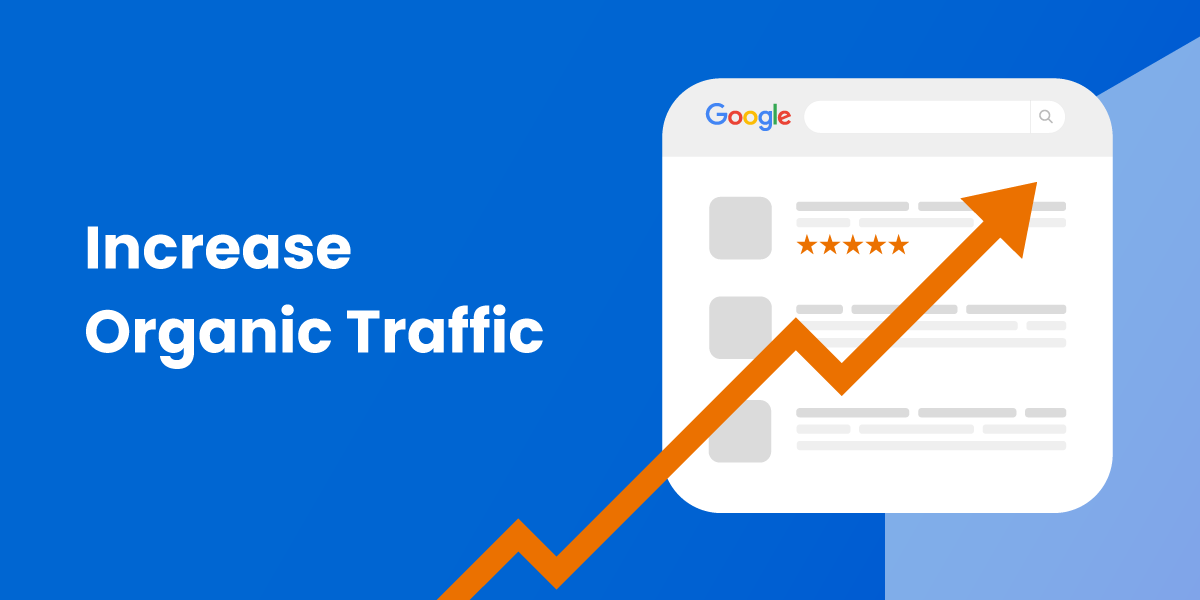How to Increase Organic Traffic to Your Ecommerce Site
Organic traffic is vital for the success of any ecommerce site. In today's digital age, where competition is fierce and consumers have endless options at their fingertips, it is crucial to find ways to attract and retain organic traffic to your website. In this article, we will explore strategies and techniques that can help you increase organic traffic to your ecommerce site in 2024 and beyond.
Understanding Organic Traffic and Its Importance
Before diving into the strategies, it is important to have a clear understanding of what organic traffic is and why it matters for ecommerce. Organic traffic refers to the visitors who arrive at your website through search engine results without any paid advertisements. It is the most valuable type of traffic as it indicates that your website is relevant and trustworthy, leading to higher conversions and customer loyalty.
Defining Organic Traffic
Organic traffic is the result of your website's visibility in search engines like Google, Bing, and Yahoo. When users search for keywords related to your business, you want your website to appear in the top search results pages. The higher your website ranks, the more organic traffic it will receive.
Let's take a closer look at how search engines determine the ranking of websites in search results. Search engines use complex algorithms that take into account various factors such as keyword relevance, website quality, user experience, and backlinks. By optimizing your website for these factors, you can improve your chances of ranking higher in search results and attracting more organic traffic.
Keyword relevance is crucial for organic traffic. When users search for specific keywords or phrases, search engines analyze the content on websites to determine their relevance. By incorporating relevant keywords into your website's content, meta tags, and headings, you can increase your visibility in search results and attract more organic traffic.
Website quality also plays a significant role in organic traffic. Search engines prioritize websites that provide valuable and engaging content, have a user-friendly design, and load quickly. By creating high-quality content that addresses the needs and interests of your target audience, you can improve your website's quality and attract more organic traffic.
User experience is another important factor in organic traffic. Search engines consider factors such as website navigation, mobile-friendliness, and page load speed when ranking websites. By optimizing your website for a seamless user experience across different devices and ensuring fast loading times, you can enhance your website's user experience and attract more organic traffic.
Backlinks are also crucial for organic traffic. Search engines view backlinks as a vote of confidence from other websites. When reputable websites link to your content, it signals to search engines that your website is trustworthy and valuable. By building a strong network of backlinks from authoritative websites, you can improve your website's credibility and attract more organic traffic.
Why Organic Traffic Matters for Ecommerce
Organic traffic is essential for ecommerce businesses as it brings in highly targeted visitors who are actively looking for the products and services you offer. Unlike paid advertisements, organic traffic provides long-term benefits, helping you establish a strong online presence and build trust with your audience.
When users find your website through organic search results, they are more likely to have a genuine interest in your products or services. This means that organic traffic has a higher potential for conversions compared to other types of traffic. By focusing on attracting organic traffic, you can increase your chances of generating sales and growing your ecommerce business.
Additionally, organic traffic is cost-effective as you don't have to pay for each click. While paid advertisements can be effective in driving traffic to your website, they require ongoing investment. With organic traffic, you can benefit from a steady stream of visitors without incurring additional costs.
Furthermore, organic traffic helps you establish a strong online presence and build trust with your audience. When your website consistently appears in search results for relevant keywords, it increases your brand visibility and credibility. Users are more likely to trust websites that appear in organic search results, leading to higher customer loyalty and repeat purchases.
Understanding organic traffic and its importance is crucial for the success of your ecommerce business. By optimizing your website for search engines and focusing on attracting organic traffic, you can increase your website's visibility, attract highly targeted visitors, and ultimately drive conversions and customer loyalty.
SEO Strategies for Boosting Organic Traffic
Search engine optimization (SEO) plays a crucial role in driving organic traffic to your ecommerce site. By optimizing various elements of your website, you can improve your rankings in search engine results. Here are some effective SEO strategies you can implement:
Keyword Research and Optimization
Keyword research is the foundation of SEO. Start by identifying relevant keywords and phrases that your target audience is searching for. Tools like Google Keyword Planner can help you find popular keywords with high search volume and low competition. Once you have identified your target keywords, optimize your website's content, meta tags, and URLs to include these keywords naturally. Remember to avoid keyword stuffing, as it can harm your rankings.
Moreover, when conducting keyword research, it's essential to consider long-tail keywords. These are longer and more specific keyword phrases that have lower search volume but higher conversion rates. By incorporating long-tail keywords into your content, you can attract more targeted traffic and increase the chances of conversion.
In addition to keyword optimization, it's crucial to focus on user intent. Understanding what users are looking for when they search for specific keywords can help you create content that aligns with their needs. By providing valuable and relevant information, you can enhance the user experience and improve your website's visibility in search engine results.
On-Page SEO Techniques
On-page SEO involves optimizing individual web pages to improve their search engine rankings. Start by optimizing your website's title tags, meta descriptions, and header tags using relevant keywords. Ensure that your website's content is well-structured with appropriate headers and subheadings. Use internal linking to connect related pages on your site, making it easier for search engines to navigate and index your content.
Furthermore, it's important to focus on creating high-quality and engaging content. Search engines prioritize websites that provide valuable information to users. By producing well-researched articles, blog posts, and product descriptions, you can establish yourself as an authority in your industry and attract more organic traffic. Additionally, incorporating multimedia elements such as images, videos, and infographics can enhance the user experience and make your content more shareable.
Another on-page SEO technique to consider is optimizing your website's loading speed. Slow-loading websites can negatively impact user experience and lead to higher bounce rates. To improve loading speed, optimize image sizes, minify CSS and JavaScript files, and leverage browser caching. By providing a fast and seamless browsing experience, you can increase the chances of visitors staying on your site and exploring more pages.
Off-Page SEO Techniques
Off-page SEO refers to activities that are done outside of your website to improve its rankings. One of the most effective off-page SEO techniques is building high-quality backlinks from reputable websites. Reach out to influencers, industry experts, and bloggers in your niche to get them to link back to your website. Guest blogging and participating in online forums can also help you build backlinks and increase your website's visibility.
Moreover, social media engagement is an important aspect of off-page SEO. By actively participating in social media platforms and sharing your website's content, you can increase brand awareness and attract more visitors. Encourage social sharing by adding social sharing buttons to your website and creating compelling and shareable content.
Additionally, online reputation management is crucial for off-page SEO. Monitor and respond to online reviews and comments about your business to maintain a positive online image. Positive reviews and mentions from satisfied customers can boost your website's credibility and improve its rankings in search engine results.
Implementing effective SEO strategies is essential for boosting organic traffic to your website. By conducting thorough keyword research, optimizing on-page elements, and engaging in off-page activities, you can improve your website's visibility in search engine results and attract more targeted visitors. Remember to stay up-to-date with the latest SEO trends and continuously monitor and analyze your website's performance to make necessary adjustments and improvements.
Leveraging Content Marketing for Organic Traffic
Content marketing is another powerful strategy for increasing organic traffic to your ecommerce site. By creating valuable and relevant content, you can attract and engage your target audience. Here are a couple of content marketing techniques that can help you drive organic traffic:
Blogging for Ecommerce
Start a blog on your ecommerce site and regularly publish informative and engaging articles related to your industry. Optimize your blog posts with relevant keywords and include internal links to your product pages. By providing valuable content, you can attract organic traffic from search engine results and establish your brand as an authority in your niche.
Video Content and Organic Traffic
Video content is becoming increasingly popular and can significantly boost your ecommerce site's organic traffic. Create compelling product videos, how-to guides, or behind-the-scenes footage to engage your audience. Optimize your videos with relevant keywords and descriptions, and share them on platforms like YouTube and social media. Videos have a higher chance of ranking in search results and can help drive more organic traffic to your site.
Utilizing Social Media to Drive Organic Traffic
Social media platforms provide a great opportunity to connect with your target audience and drive organic traffic to your ecommerce site. Here are a few tips for leveraging social media effectively:
Social Media Platforms for Ecommerce
Identify the social media platforms that are most relevant to your target audience and focus your efforts on those platforms. Platforms like Facebook, Instagram, and Pinterest are often popular for ecommerce businesses. Create engaging content and share it on these platforms regularly. Encourage your followers to share your content, and consider running contests or giveaways to attract more organic traffic.
Best Practices for Social Media Marketing
When using social media for organic traffic, it is important to follow some best practices. Consistency is key, so make sure you regularly post high-quality content and engage with your followers. Utilize relevant hashtags and encourage user-generated content to increase your organic reach. Additionally, consider partnering with influencers or running paid social media ads to further boost your organic traffic.
Mobile Optimization for Ecommerce Sites
In today's mobile-dominated world, having a mobile-friendly ecommerce site is essential for driving organic traffic. Here are a few tips for mobile optimization:
Importance of Mobile Optimization
Mobile optimization is crucial because a large percentage of internet users browse the web using their mobile devices. If your website is not optimized for mobile, visitors may have a poor user experience, leading to high bounce rates and low organic traffic. A mobile-friendly site also improves your search engine rankings, as Google prioritizes mobile-friendly websites in its search results.
Tips for Mobile-Friendly Ecommerce Sites
Ensure that your website's design is responsive, meaning it can adapt to different screen sizes and resolutions. Optimize your images and videos for fast loading on mobile devices. Implement easy navigation and clear calls to action, as users are more likely to convert if the shopping experience is seamless on mobile. Regularly test your website's performance on different mobile devices to ensure optimal user experience.
Conclusion
Increasing organic traffic to your ecommerce site requires a combination of SEO strategies, content marketing, social media efforts, and mobile optimization. By implementing these techniques, you can attract more targeted visitors, improve your search engine rankings, and drive the growth of your ecommerce business in 2024 and beyond.

 Drive More Visibility, Traffic, and Sales
Drive More Visibility, Traffic, and Sales
